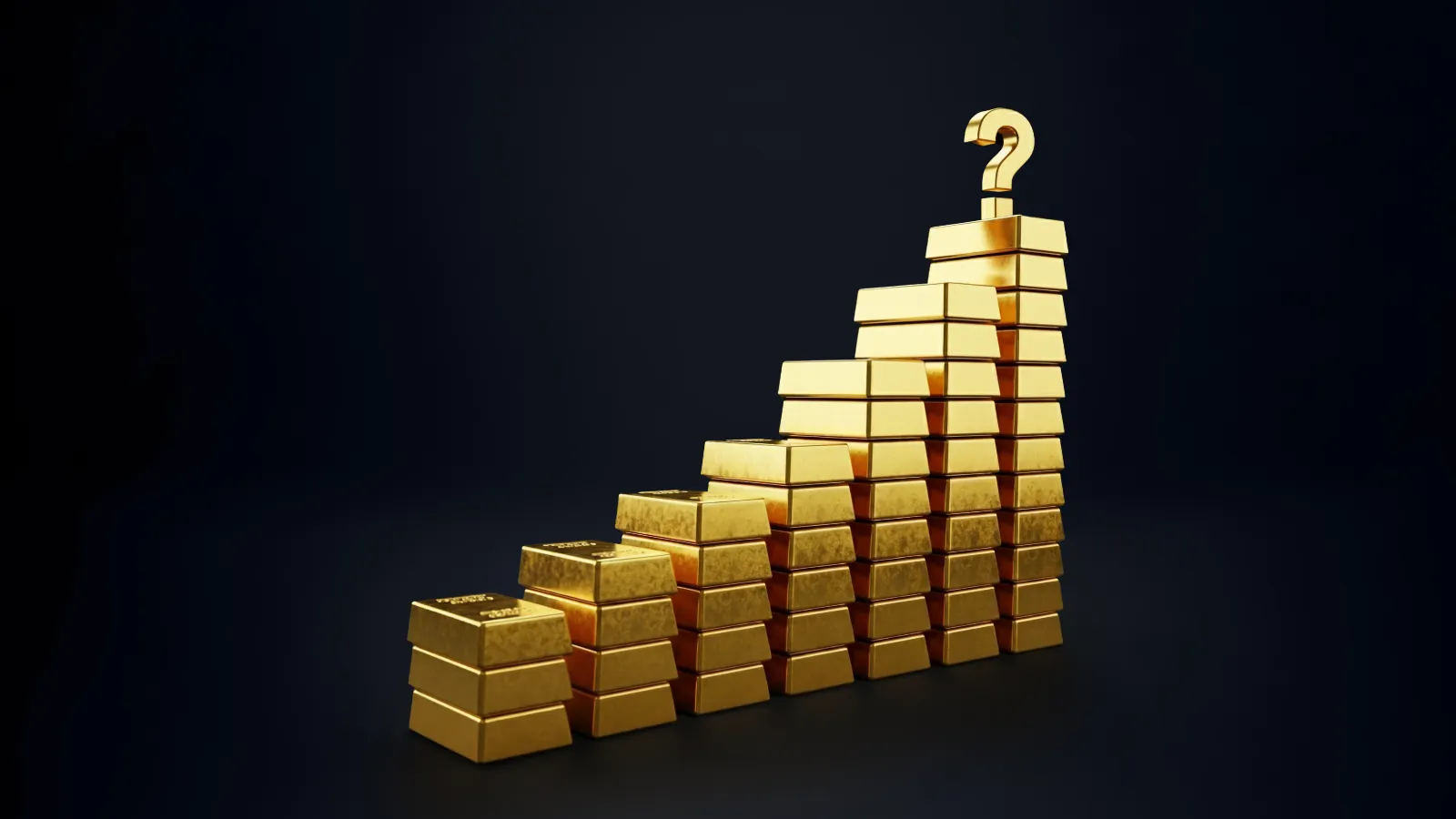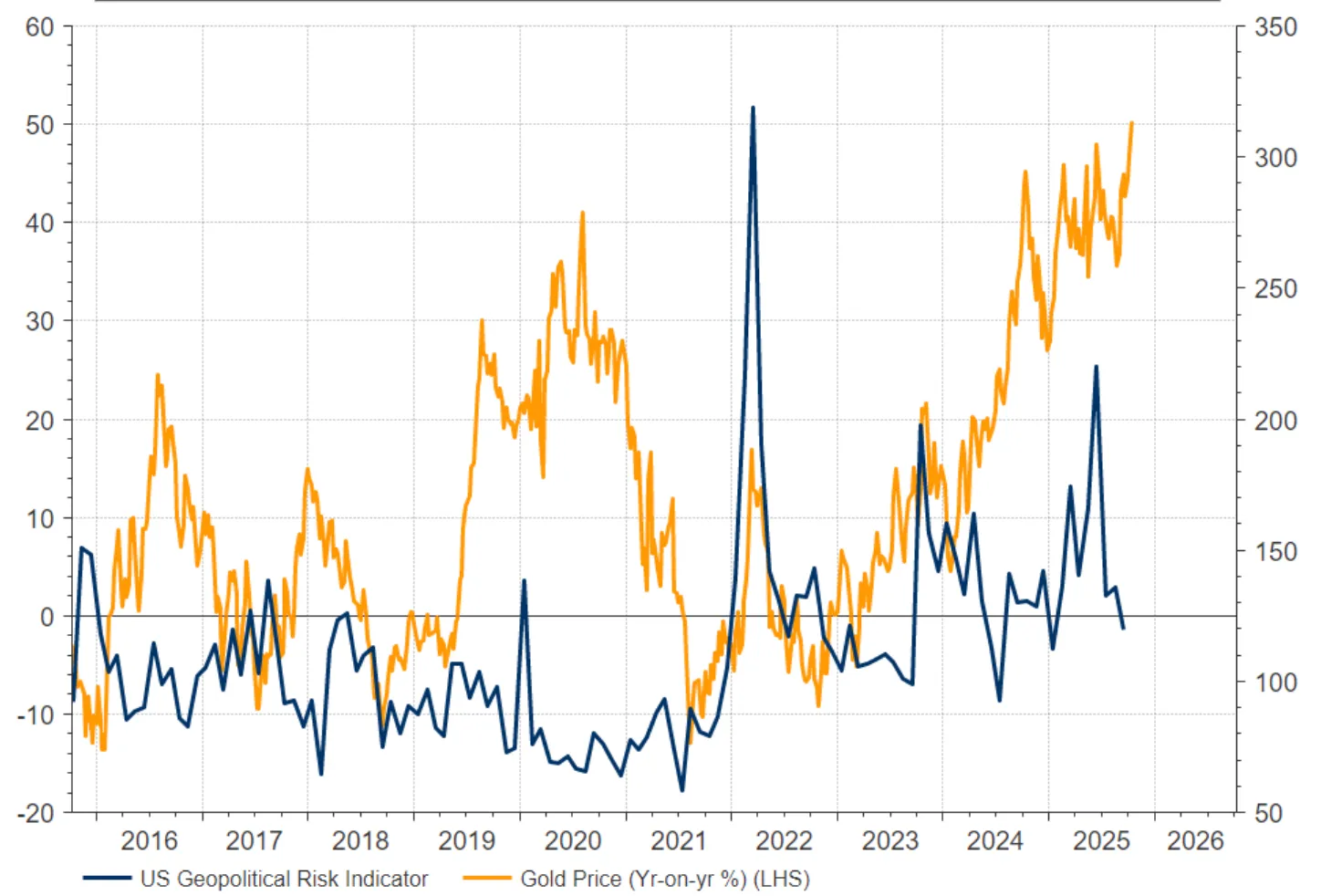Gold price hits USD 4,100 record: Can the rally hold or is it nearing exhaustion?
Gold price hits USD 4,100 record: Can the rally hold or is it nearing exhaustion?
Gold price hits USD 4,100 record: Can the rally hold or is it nearing exhaustion?

According to analysts, gold’s record-breaking climb above $4,100 an ounce may still have more room to run - though the pace is expected to moderate. They say while strong safe-haven demand and central bank buying remain key supports, much of the current momentum is driven by liquidity and policy expectations rather than fear. That means the metal could consolidate before attempting a move toward $4,500, depending on how inflation, interest rates, and geopolitical tensions evolve over the next quarter.
Key takeaways
- Gold has surged nearly 60% in 2025, breaking $4,200/oz for the first time amid renewed U.S.–China trade tensions and persistent global risk aversion.
- The rally has occurred alongside strong equity markets, suggesting liquidity-driven optimism rather than fear-based buying.
- Central bank and ETF demand remain crucial to the uptrend, helping investors hedge against inflation and currency debasement.
- Deutsche Bank says gold’s rally has “peaked in trendiness,” implying a pause or consolidation could be next.
- Goldman Sachs, Société Générale, and JPMorgan remain bullish, forecasting gold could still reach $5,000/oz.
- Rising real yields or easing political tensions could cause short-term weakness, but long-term fundamentals remain favourable.
Gold’s record-breaking run and safe-haven surge
Gold’s climb through $4,100 marks a milestone in a year already filled with volatility. The latest upswing came after Washington and Beijing imposed new port fees on shipping cargo, reviving trade-war fears and boosting safe-haven buying.
Prices briefly surged past $4,200 before stabilising around $4,125, reflecting how sensitive markets remain to geopolitical developments. Yet what’s striking is that this rally has continued even as global equities stay near record highs - a signal that gold is now being driven as much by liquidity and monetary policy as by fear.
Political turbulence has reinforced the metal’s appeal. France’s government collapse, Japan’s leadership change, and a prolonged U.S. government shutdown have reminded investors of the value of stability amid global uncertainty.
Gold keeps surging as geopolitical risk indexes slip

Gold-equity correlation: Why are both markets rising together
For much of modern history, gold has thrived when equities falter. But in 2025, both are climbing - an unusual pattern driven by abundant liquidity and lower interest-rate expectations rather than investor panic.
The Federal Reserve’s easing cycle is central to this shift. After September’s rate cut, markets expect another 25 basis-point reduction this month. Fed Chair Jerome Powell’s upcoming address is likely to acknowledge delayed economic data from the ongoing U.S. government shutdown, but traders already anticipate a more dovish policy path.
Lower real yields make gold more attractive relative to income-generating assets. Combined with strong ETF inflows and renewed institutional buying, the metal has become a key part of diversified portfolios - no longer just a crisis hedge, but a liquidity play.
Safe-haven sentiment: Is this a new era or peak euphoria?
Opinions remain sharply divided.
- Goldman Sachs forecasts another 20% rise by 2026, citing inflation persistence and macro uncertainty.
- Société Générale calls a climb to $5,000/oz “inevitable,” highlighting steady central bank accumulation.
- JPMorgan continues to view gold as one of its highest conviction cross-asset trades.
Still, Deutsche Bank warns the uptrend may have “peaked in trendiness.” The current rally has lasted roughly 50% longer than the typical cycle, suggesting fatigue among speculative buyers.
Similarly, HSBC believes easing political or military risks could slow momentum, predicting sideways trading rather than a dramatic reversal as sentiment cools.
Central bank gold buying: Disconnect from fundamentals
Gold’s surge has increasingly diverged from its traditional drivers. Normally, lower real yields and higher risk aversion explain price gains, yet gold has remained elevated even as uncertainty indices declined and the U.S. dollar strengthened modestly.
According to JPMorgan, the answer lies in physical demand. Central banks - especially in emerging markets - are building reserves as part of a long-term de-dollarisation trend. Coupled with sustained ETF inflows, this demand has created a strong floor under prices.
The result: gold is behaving less like a defensive hedge and more like a momentum asset, rising independently of traditional macro triggers.
Gold price prediction 2025: Policy signals and the next move
Recent price action shows gold reacting sharply to changes in rate expectations. When the Fed’s implied terminal rate dropped below 2.9%, gold spiked. But as the rate outlook edged higher in recent weeks, the U.S. dollar strengthened, placing short-term resistance near $4,200.

Meanwhile, tariff threats, export curbs, and European political tensions continue to feed safe-haven demand. Still, if these risks subside, gold could consolidate before making its next decisive move higher.
Gold price technical analysis
Gold remains above $4,100, with key support around $3,947.
A strong base could push the metal toward $4,250–$4,300, while a break lower might invite short-term selling before new buying emerges near $3,600–$3,300.

Traders tracking gold’s volatility can use Deriv MT5 and Deriv Trader for advanced charting, indicators, and risk management tools to navigate short-term price swings.
Trading gold on Deriv platforms: Volumes, and trader strategies
Gold remains one of the most actively traded instruments on Deriv’s platforms. During the latest rally, gold CFD trading volumes on Deriv MT5 increased by more than 40%, as traders capitalised on short-term volatility and major breakout levels.
Deriv MT5 remains the preferred platform for traders seeking multi-asset analysis and fast execution, providing access to correlated assets like indices and major currency pairs. Its professional charting environment supports deeper technical and macro-based strategies across timeframes.
Popular trader strategies
- Range trading: Taking advantage of fluctuations between $4,090 and $4,250 with disciplined stop-losses.
- Breakout trading: Targeting moves beyond $4,300 and $4,500 following economic data or policy announcements.
- Cross-asset hedging: Using gold exposure to offset risks in USD/JPY or major stock indices.
Before executing trades, users can estimate margins, pip values, and potential outcomes using Deriv’s trading calculator for precise risk management.
Gold investment outlook
The 2025 gold rally reflects both fear and conviction - fear of inflation and sovereign debt, and conviction that policymakers will continue to favour stimulus over austerity.
If prices hold above $4,000, consolidation could draw new institutional interest. Renewed political tensions or further rate cuts might propel gold to $4,500, while stabilising yields could lead to a $3,600–$3,900 trading range without breaking the longer-term uptrend.
For a wider perspective, see on Bitcoin market trends. Before taking a position, you can also use Deriv’s trading calculator to model potential returns and risk exposure across markets.
The performance figures quoted are not a guarantee of future performance.















